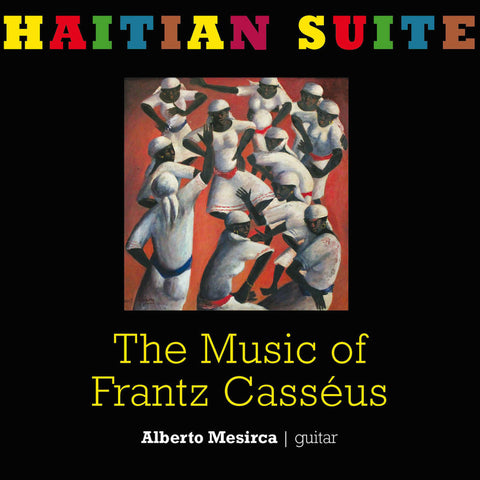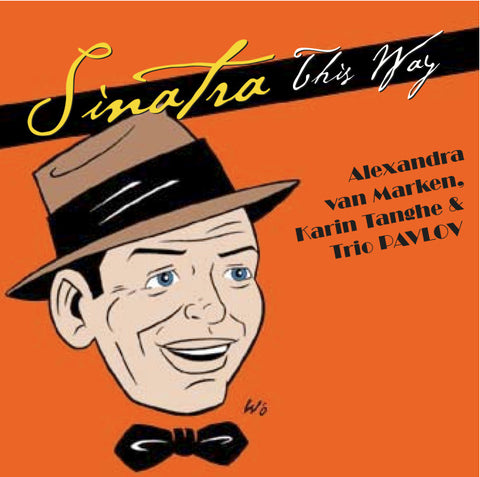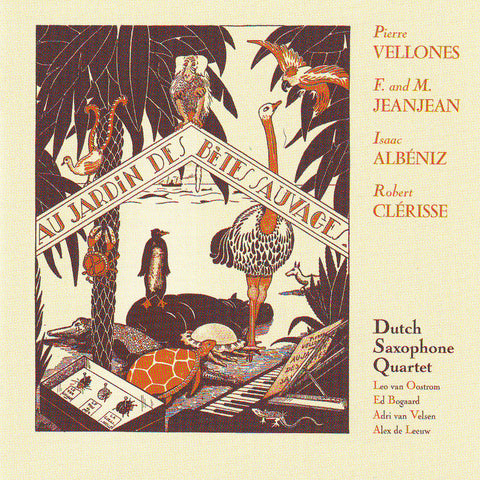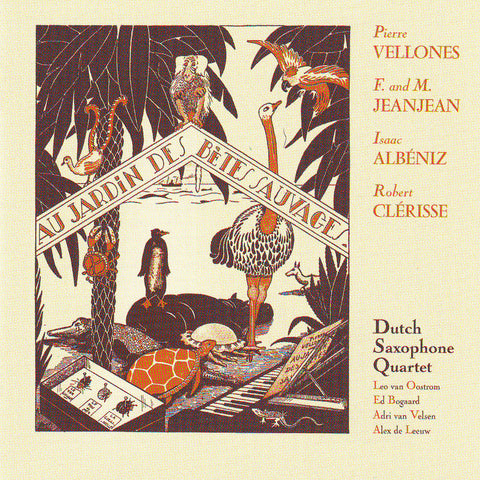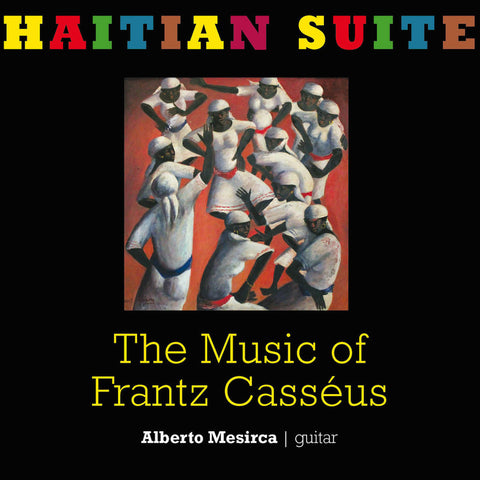
Alberto Mesirca - Haitian Suite - Digital Download
Basta Music
Guitarist and composer Frantz Casséus (1915-1993) was born in Port-au-Prince in Haiti. He moved to America in 1946 where he gave many recitals of the Western classical guitar repertoire in (a.o.) Carnegie Hall and Town Hall. Living in New York gave him a different perspective on the music from his home land Haiti and from a feeling of nostalgia Casséus composed an impressive body of work for the classical guitar that has an unmistakable Haitian flavour. It is precisely this aspect of the music that makes it so enchanting and original.
Casséus recorded several albums of his own compositions for the Folkways label in the early 1950's and played guitar for the popular Calypso singer Harry Belafonte with whom he recorded and toured in the late 1950's. Belafonte even had a worldwide hit with a song that Casséus composed as part of his "Haitian Suite." ("Merci Bon Dieu")
In the late 1960's a young and aspiring guitarist from Newark, New Jersey, by the name of Marc Ribot started taking regular Sunday guitar lessons with Mr. Casséus which would eventually lead him to his own path in music, working with (a.o.) Brenda & The Realtones, The Lounge Lizards, Tom Waits, John Zorn, Marianne Faithful, Elvis Costello, Henry Grimes, Robert Plant, Leon Russel and many others.
After his teacher passed away in 1993, Ribot recorded a cd of Casséus' music for Les Disques de Crepuscule ('Marc Ribot plays solo guitar works by Frantz Casséus,' TWI 979-2). Ribot's intention was to make Casséus' compositions available to classical guitarists in the hope that a new interest in his music would occur and that a new generation of guitarists would bring it back to the concert podia. Unfortunately, this did not happen! At the time the catalogue was limited to 19 titles, all of which are present on Ribot's recording. However, in recent years Ribot retrieved an old sketchbook ('N99') by Casséus that contained eighteen new and unpublished pieces. These were prepared for recording by guitarist Alberto Mesirca from Venice, Italy, in close collaboration with Mr. Ribot.
Marc Ribot said about Alberto Mesirca:
Mr. Mesirca worked tirelessly on editing the manuscript and perfecting its performance. We compared notes on which compositions were complete enough to be released, which studies were different enough from later versions to merit consideration as new compositions, etc etc. By the time the work had been catalogued, the pieces in this Note Book 99 had increased Mr. Casséus’ oeuvre for solo classical guitar by nearly 90 percent, adding many stunning new pieces and shedding light on the development and process of an important but neglected composer. The result is the CD Mr. Mesirca is now presenting, a world premier of eighteen new pieces, and brilliant renditions of existing work. Together, these constitute an exciting and unique event in the worlds of both Haitian music and classical guitar. One might imagine I’d feel competitive at having my status as the main interpreter of Frantz’s music ended. In fact, this status was always by default. My purpose in recording the music was always to keep it alive till something like this could happen. I feel like a weight has been lifted, and the music is finally being placed where Frantz wanted it to be. In Alberto Mesirca, the work has found the most skilled, dedicated, and sensitive interpreter imaginable; and through the work, the listener can hear a formidable classical guitarist perform.
Frantz would have been thrilled.
Casséus recorded several albums of his own compositions for the Folkways label in the early 1950's and played guitar for the popular Calypso singer Harry Belafonte with whom he recorded and toured in the late 1950's. Belafonte even had a worldwide hit with a song that Casséus composed as part of his "Haitian Suite." ("Merci Bon Dieu")
In the late 1960's a young and aspiring guitarist from Newark, New Jersey, by the name of Marc Ribot started taking regular Sunday guitar lessons with Mr. Casséus which would eventually lead him to his own path in music, working with (a.o.) Brenda & The Realtones, The Lounge Lizards, Tom Waits, John Zorn, Marianne Faithful, Elvis Costello, Henry Grimes, Robert Plant, Leon Russel and many others.
After his teacher passed away in 1993, Ribot recorded a cd of Casséus' music for Les Disques de Crepuscule ('Marc Ribot plays solo guitar works by Frantz Casséus,' TWI 979-2). Ribot's intention was to make Casséus' compositions available to classical guitarists in the hope that a new interest in his music would occur and that a new generation of guitarists would bring it back to the concert podia. Unfortunately, this did not happen! At the time the catalogue was limited to 19 titles, all of which are present on Ribot's recording. However, in recent years Ribot retrieved an old sketchbook ('N99') by Casséus that contained eighteen new and unpublished pieces. These were prepared for recording by guitarist Alberto Mesirca from Venice, Italy, in close collaboration with Mr. Ribot.
Marc Ribot said about Alberto Mesirca:
Mr. Mesirca worked tirelessly on editing the manuscript and perfecting its performance. We compared notes on which compositions were complete enough to be released, which studies were different enough from later versions to merit consideration as new compositions, etc etc. By the time the work had been catalogued, the pieces in this Note Book 99 had increased Mr. Casséus’ oeuvre for solo classical guitar by nearly 90 percent, adding many stunning new pieces and shedding light on the development and process of an important but neglected composer. The result is the CD Mr. Mesirca is now presenting, a world premier of eighteen new pieces, and brilliant renditions of existing work. Together, these constitute an exciting and unique event in the worlds of both Haitian music and classical guitar. One might imagine I’d feel competitive at having my status as the main interpreter of Frantz’s music ended. In fact, this status was always by default. My purpose in recording the music was always to keep it alive till something like this could happen. I feel like a weight has been lifted, and the music is finally being placed where Frantz wanted it to be. In Alberto Mesirca, the work has found the most skilled, dedicated, and sensitive interpreter imaginable; and through the work, the listener can hear a formidable classical guitarist perform.
Frantz would have been thrilled.
Order the album directly from us as Digital Download: you will receive high quality mp3s (320 kbps). Or listen on Spotify:
More from this collection

